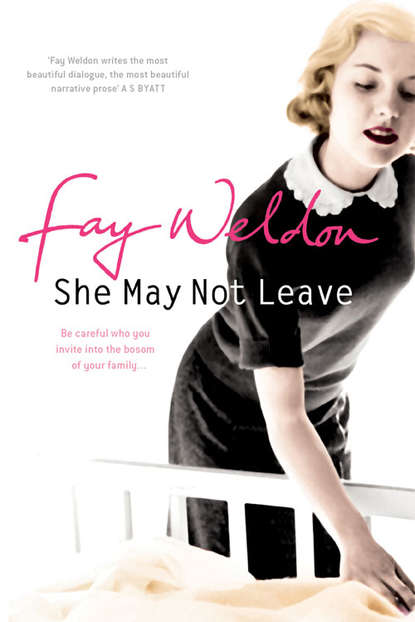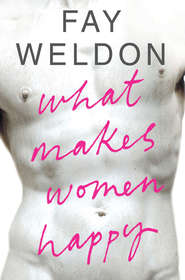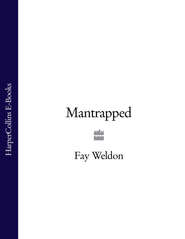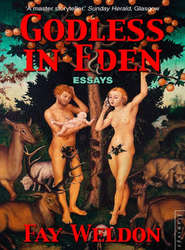По всем вопросам обращайтесь на: info@litportal.ru
(©) 2003-2024.
✖
She May Not Leave
Автор
Год написания книги
2018
Настройки чтения
Размер шрифта
Высота строк
Поля
‘Oh, don’t be,’ she says, ‘I am sure he is suffering enough.’ ‘I am suffering too,’ I say, ‘I have suitors. But I must say I am faltering in my Penelope role. Three years is a long time.’ ‘Oh, don’t!’ she implores. ‘Just give up and behave like a grandmother and wait.’
‘He should have looked behind him,’ I say. ‘A police car followed them for forty miles and they didn’t even bother to look behind. In a car packed with illegal drugs!’
‘Perhaps he didn’t know they were in there. And he wasn’t driving.’
‘Oh, come off it,’ I say. ‘Don’t you start excusing him too.
Last time I saw him he said, “I did it for you.” That made me really cross. He committed the crime, not me.’
Hattie laughs and says it’s true, men have a knack of making their womenfolk responsible for everything that goes wrong. Martyn will open the front door and turn to her and say ‘but it’s raining’ as if it were her fault.
Sebastian is my third husband, fourth if I include Curran, so I like to think I have some knowledge of the ways of men, in the house and out of it. I regale her with tales of husbands who pat their pot bellies and smile and tell you it’s your fault because your cooking is so good, blame you for their adulteries (your fault I slept with her: you were too cold, snored too loudly, not there enough – anything). Your fault I lost my job, you did not iron my shirts. Your fault I am in prison, I did it for you. Serena’s previous husband George gave up painting pictures and in future years was of course to blame Serena for failing to dissuade him from doing so. You should never try to make a man do anything, Serena says, that he doesn’t want to. It always bounces back to you.
I love you, I love you, is the mating cry of the arriving male. All your fault, as he departs.
I met and married Sebastian when I was thirty-eight: he was forty. We had no children together: he had two by an earlier marriage: I had accumulated two along the way. I can only hope that imprisonment will not have the same effect on Sebastian as the heart attack had on George: that he will not, like George, encounter some therapist who will encourage him in the belief that it’s all the wife’s fault and the only way to survive is to leave her. To break the ties that bind. It is a fairly absurd worry. Fortunately counsellors are in short supply in Dutch prisons.
‘Codswallop,’ I say to my grand-daughter, ‘Sebastian just wanted some excitement.’ But I tell her I am only joking about the suitors, I will wait patiently for my husband’s return, and I will.
Miraculously, we have managed to keep Sebastian’s conviction from the press. He is Serena’s brother-in-law, and as such could attract attention. And though I tell her publicity is good for sales, she says she is never sure of that; the more people know about your feet of clay, the less they want to buy your books and she certainly does not want to be pitied on account of a feckless brother-in-law. At seventy-three she is still working – novels, plays, occasional journalism – if you are self-employed there is always last year’s tax to be paid.
When Sebastian went inside, Serena paid off our mortgage, so I can just about manage the bills. A small amount comes in from the gallery; in these days of conceptual art normal people still buy paintings in frames. Serena flies Club Class on a scheduled flight to Amsterdam every six weeks or so to visit Sebastian: Cranmer, her much younger husband – though at fifty-five he’s scarcely a toyboy – or some other family member goes with her. As a family we give each other what support we can. I mostly go on my own, on easyJet from Bristol airport at a quarter the cost.
I can feel Martyn in the background, thinking Hattie has been on the phone too long, chattering, and wanting her to pay more attention to him. His family don’t chatter, as Hattie’s does. I hear him putting on the radio in the background, clomping about. Well, why should he not? When the man works and earns and the woman does not, it is only meet and fitting that his interests should take precedence over hers. ‘I’d better go,’ I say. ‘Bless you for calling. I’m just fine and I think you should go back to work.’
‘Thanks for your permission, Gran,’ she says, but stays on the line. ‘Don’t worry about Sebastian; he’ll be all right. He has his art to keep him warm. I remember Great-Gran saying in the middle of the trial, just before she died, that at least prisons were comparatively draught-free. He should think himself lucky.’
Hattie’s great-grandmother Wanda had three daughters: Susan, Serena and Frances the youngest, that is to say myself. And Frances gave birth to Lallie, and Lallie gave birth to Hattie, and Hattie gave birth to Kitty. Wanda died the day Sebastian was sentenced to his three years – leaving her descendants, though distraught at her loss, at least now with time and energy to go prison visiting. I do not say she timed her death for Sebastian’s benefit, but it would not have been out of character if she had. She brought us up to be dutiful and attentive to family responsibilities at whatever cost to ourselves. Susan, our eldest sister, died of cancer in her late thirties. My mother was a stoical person, but ever since then, she complained, she felt the cold. Draughts loomed large in her later life.
Hattie has not been to visit Sebastian in prison, though she always asks after him, and writes. Well, she has been pregnant and now she has a small baby, and though of course he has not said so, Martyn would feel easier if she did not go. He has his position at the magazine to think about, and his political ambitions. He hopes to stand for Parliament at the next election, and does not want his position compromised by a step-grandfather in prison.
‘All right, darling,’ she says to Martyn. ‘I’m just coming. I think I left the car key under the nappies.’ And she says good-bye to me and is gone.
Sebastian In Prison (#ulink_b609aa11-54f1-5140-94bd-7052b6ac2f4e)
Sebastian is allowed two visitors once a week, if all goes smoothly at the Bijlmer prison, and so far it has. The authorities encourage him to paint. They changed his cell so that he could stand an easel up in it. They like their prisoners to be creative. They can hang his paintings on the walls of that bleak place. He is, after all, a Royal Academician. He cooks excellent curries for other prisoners in his block. No one has raped him or even sworn at him. The wardens address him as Mr Watt. Even so, the Bijlmer is a horrible, frightening, noisy, clanging, terrible place, but villains are villains only some of the time and if you are careful to be out of their way when they are in violent criminal mode, you can get by. So Sebastian tells us.
But I want him home where he’s safe, and can hear birdsong. I try not to think of him too much. He paints in oils: the house still smells of them, though the turps is drying up in the jam jars and the brushes stiffening: sometimes I catch a movement out of the corner of my eye and see what can only be his shadow through the open door of the attic. I never knew before now that the living could haunt a place. But Sebastian manages. It’s a kind of company but I would rather have the real thing. Sebastian became an RA twenty-five years ago; he had his name in the gossip columns and an exhibition at the Marlborough Gallery. He was once a member of the Arts Council, but no longer. He went on painting landscapes in frames long after everyone else had stopped. He is an idealist and a romantic. This is why he is in trouble.
Sebastian believes in the right of the artist to live in whatever state of mind they choose, natural or one that is chemically induced, drugs also being God-given. In the same way, he tells me, that women with pale lips choose to use lipstick to make them brighter. He denies the right of Government to deny choice to the individual. He is perfectly intelligent in other ways, and indeed charming, but he does not hear me when I say, in my mother Wanda’s voice, that a principle so convenient can hardly be counted as a principle, it is too laced with self-interest.
Sebastian, after the manner of men, tends to be deaf to uncomfortable truths. He believes himself to be a favourite of the God who gave him his artistic gift. His defence lawyer described him as paraphrenic – a person sane in all respects except one. His capacity for trust is pathological. He would meet up with his criminal associates in the Royal Academy restaurant, thinking that was perfect cover, though the ladies up from the provinces would look askance over their quiche and the white wine at the expensive, flashy suits and talk knowingly about ‘bling’. When he was in Holland and fingered by these friends of his, Sebastian was the only one surprised. That is my reading of the situation. He never told me the detail. He was ashamed.
A Further Ethical Discussion After Supper (#ulink_6764ee65-c2fc-5a7c-938b-32baa8aaef74)
‘With your Swedish background,’ says Martyn to Hattie, ‘I am surprised you take the view you do.’ He will not let up. He is no longer hungry but he is unsatisfied, and deprived of sensual pleasures. Baby Kitty still sleeps in a cot next to their bed. Martyn can see the sense of it, but wishes the baby slept in a separate room. Sometimes he wakes in the night and reaches out for his wife, which seems his natural right, and finds Hattie sitting up and feeding Kitty. (He knows she is not his wife but his partner, and thus ‘natural right’ is the more questionable: it is one of the subliminal reasons why he would marry her if he could.)
Hattie will look at the child with what Martyn hopes is adoration, but suspects it is something more like amazement. She feels uneasy about making love while dripping milk from her breasts. For someone who rather dislikes the thought of breast-feeding – so cowlike – she produces a remarkable amount of this sweetish, delicately scented liquid from her nipples. Martyn, too, is amazed. It puts him in mind of a film he saw as a child about the exploitation of workers in the Malaysian rubber plantations. Cuts were made in bark and a strange yellowish goo would seep out. He was revolted. He knows breast-feeding is natural and right but he wishes Kitty fed from a bottle. He preferred it when Hattie’s breasts were erotic signifiers rather than dedicated to feeding another, even though that other has sprung from his seed. Indeed, Martyn finds the processes of parturition so bizarre as to be almost beyond belief.
Since the birth, he, who was once so scientifically reluctant and talked about Nature in the same way as people once talked about God – as the source of all goodness – finds himself all for cloning, test tubes, stem cell research, artificial wombs, GM crops and the like. The further from Nature and the more subject to intelligence and contrivance, the better. It has crossed his mind that an au pair would take up the spare room, and that this postpones the baby having a room of its own, and makes the likelihood of any decent, noisy, bounce-around-the-house sex even more remote than before.
‘What has my Swedish father got to do with anything?’ asks Hattie. Martyn points out that a Swedish Prime Minister’s wife, a full-time working lawyer, was lately in trouble for employing a maid to clean their house. That she should do so was seen as demeaning to her, her husband and the maid. In Sweden, people are expected to clean up after themselves.
‘Now we, who are meant to be working for the New Jerusalem, are to have a servant?’ Martyn asks, ‘Where are our principles?’
Hattie almost giggles. Sometimes she thinks he is addressing a public meeting, not her, but he has a future as a politician so she forgives him: he has to get into practice.
‘She’s not a servant,’ says Hattie, firmly. ‘She is an au pair.
Or a nanny. I don’t know which she will prefer to be called.’ ‘Whatever – she will be doing our dirty work because we can afford to have her do it, and she can’t afford not to do it,’ says Martyn. ‘What’s that if not a servant? Get real, Hattie. By all means do what’s convenient, but understand what you’re doing.’
‘We are embarking on a fair and sensible division of labour,’ says Hattie haughtily, seeing that mirth will not distract him.
‘Have you thought about the consequences of being an employer?’ Martyn asks. ‘Are we doing it officially, paying for insurance stamps, taking tax at source and so on? I certainly hope so.’
‘If she’s working part-time and lives in, she doesn’t need stamps,’ says Hattie. ‘She counts as one of the family. I asked Babs.’
‘I assume you’ve seen her visa, and she’s entitled to be in this country?’
‘Agnieszka doesn’t need a visa. She’s from Poland,’ says Hattie. ‘We’re all Europeans now. We must be hospitable and do everything we can to make her welcome. It’s all rather exciting.’
She has a vague idea of Agnieszka as a simple farm girl, from a backward country, with a poor education, but welltrained by her mother in the traditional domestic arts. Hattie will be able to teach her, and enlighten her, and show her how forward-thinking people live.
‘I wouldn’t be too sure,’ says Martyn. ‘She’ll probably hate it here and leave within the week anyway.’
Both come from long lines of arguers and defenders of principle in the face of all opposition.
To The Left! (#ulink_67705bfc-d1b3-5c61-9227-e38cffb06b0a)
In 1897 Kitty’s great-great-great-great-grandfather, a musician, joined forces with Havelock Ellis the sexologist and wrote to the Archbishop of Canterbury urging him to acknowledge the entitlement of young women to free sex. He forthwith lost his job as Director of the Royal Academy of Music, and had to flee to San Francisco, but it was a sacrifice gladly made in the interest of early feminism and the onward march of humanity.
Kitty’s great-great-great-grandfather, a popular writer, went to the Soviet Union in the mid-thirties and came back to report a socialist and artistic paradise. Thereafter there was no stopping the left-footed march of the family, certainly on the female side.
When the Campaign for Nuclear Disarmament began, Kitty’s great-great-grandmother Wanda walked from Aldermaston to London, her daughters Susan, Serena and Frances at her side. In 1968, Serena’s second husband George was arrested for his part in the Grosvenor Square demonstration against the Vietnam War. In the seventies Serena’s boys Oliver and Christopher put on balaclavas and threw aniseed balls over walls to distract guard dogs – though I can’t remember what that was about. Serena and George housed an anti-apartheid activist in their house in Caldicott Square. Susan’s children and grandchildren still turn up to march against the war in Iraq. It’s in the blood. Even Lallie signs petitions to save veal calves from export. Hattie has demonstrated against GM crops – that was probably the time she and Martyn met crammed up against one another in an alley. One way and another it is amazing that the world is not yet perfect. The forces of reaction must be strong indeed not to fall in the face of so much good feeling and hope for the future, over so many generations.
From Kitty’s father comes a different strain, a more orderly, stubborn, self-righteous kind of gene: oppressed and poor, the family rise up to demand their rights. Martyn, educated and sustained by the kindly State they have brought about, works as a commissioning editor for Devolution, a philosophical and cultural monthly. It runs articles about plenary targets, enablement, and the statistics of State control. These days Martyn feels he has the opportunity to change the world from the inside out, and no longer needs to go on demos, which are only for those who don’t know the inner story, as he does. He too is certain that he is helping the world towards a better future.
I wonder what Kitty will do with her life? If she takes after her father’s side, she will end up working for some NGO, I daresay, looking after the asbestos miners of Limpopo. If she favours her mother’s side, and all the mess and mayhem attendant on their particular talents, she will be a musician, a writer, a painter, or even a protesting playwright. You may think I’m obsessive about the gene thing, but I have watched it work out over generations. We are the sum of our ancestors and there is no escape. Baby Kitty looks at me with pre-conditioned eyes, even as she holds out her little arms and smiles.
Acceptance (#ulink_86dff24f-7c1c-5709-be85-fe3d2d4e3464)
Martyn cheers up, for no apparent reason, rolls the name around his tongue, and likes it. ‘Agnyeshh-kah,’ he says, savouring the syllables. ‘I suppose it is less gloomy than Agnes. And you’re quite right. It’s antisocial to have a room going spare at a time when there’s such a pressure upon housing. Tell you what, Hattie, I’m still hungry. Supposing I get some fish-and-chips?’
Hattie looks at him in no little alarm. Hasn’t he just eaten? Can he still be hungry? Is this why he wants the car keys? To buy fish and chips? A dozen thoughts flow through her mind, oddly disorganised. Fish fried in batter is unhealthy on many counts, not just for the individual but for the planet. Re-used oil has carcinogenic properties. The batter itself is fattening. The wheat used, unless organic, will have been sprayed many times with toxic chemicals. Batter can be removed before eating, true, but the seas are being denuded of fish and good citizens are cutting down on their consumption. And isn’t there something about dolphins? Don’t they get caught in the trawler nets and die horribly? Hattie seems to remember that though dolphins occasionally save swimmers from sharks, they also get a bad press these days: apparently the young males chase and gang-rape the females. On the other hand Martyn has often said that fish and chips remind him of his childhood in Newcastle and doesn’t she love him and want him to be happy?
‘You could get an Indian, I suppose,’ she concedes. ‘Though the District Nurse is against curry. It gets through into Kitty’s milk.’
From time to time Martyn goes into what Hattie calls ‘shaggy mode’: his sandy hair sticks up, the skin on his face seems too loose for its bones, his eyes are too large for their sockets. It happens when he is in despair but doesn’t know it. At such times Hattie feels both great affection and pity for him. She capitulates.











